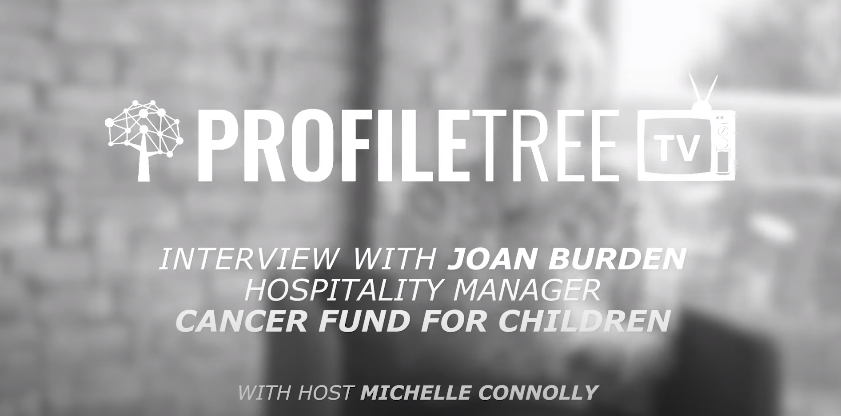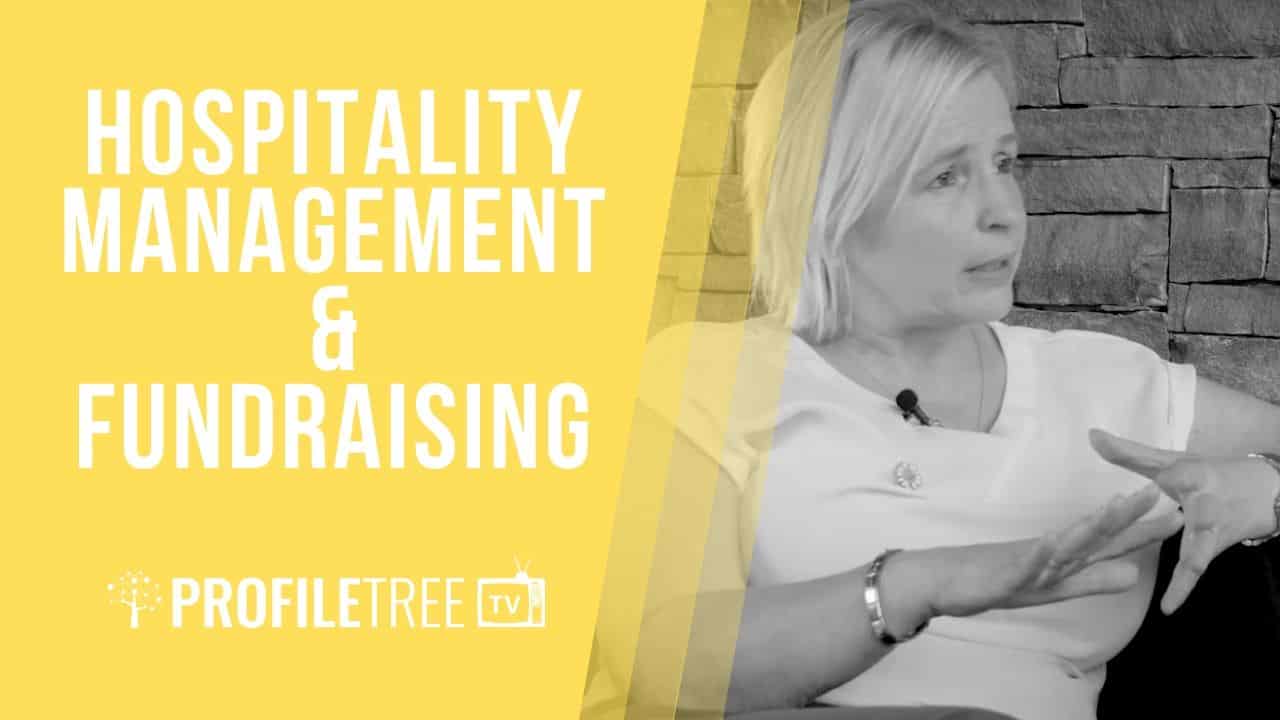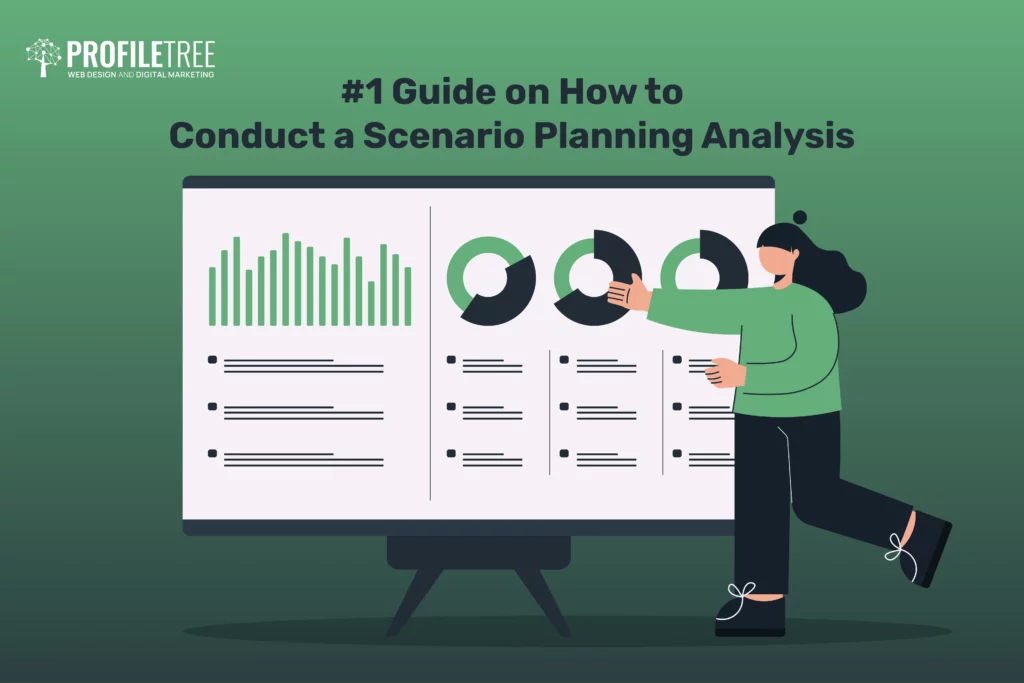How Hospitality Management Has Benefited Fundraising for Cancer Fund For Children
We sat down with Joan Burden, hospitality manager at Cancer Fund for Children to learn more about what Daisy Lodge offers families that are affected by cancer, her experience in hospitality management and how holding conferences and events for businesses at the facility supports fundraising for the charity.
Burden comes from a hospitality background with over twenty years experience and then moved on into the hospitality management industry. Within the charity, Burden has been with Cancer Fund for Children for 22 years and understands the amazing work that the charity does. Her role in hospitality management looks after all the services offered in Daisy Lodge for families visiting the facility from front-of-house to the catering and housekeeping for families visiting for a therapeutic break.
Daisy Lodge is located in Newcastle, Co.Down in Northern Ireland. It’s a modern facility that offers many services to support families that have been affected by cancer. The free therapeutic short breaks offered at Daisy Lodge are available to families with children diagnosed with cancer; families where a parent has been diagnosed with cancer, young adults diagnosed with cancer as well as families that have been bereaved and are supported by Cancer Fund for Children.
The charity recognises and understands that cancer not only affects one person in a family but the family as a whole. This is why at Daisy Lodge, they look to create a space that the entire family can find support and use the services to help them.
Table of Contents

The goal of Daisy Lodge is to provide a warm and relaxing place for families affected by cancer to create new memories together and take away the stress of everyday life.
For parents with children affected by cancer, the facility provides nutritious meals that take away the stress of having to cook and more time as a family. The superb facility offers support to their families with a variety of services. This ranges from short break accommodation, individual and family group therapy support and complementary therapies.

Daisy Lodge not only provides support for families from their professional team but Burden speaks about how families staying in the facility becoming friends over their visits and providing further support to each other even outside of Daisy Lodge.
Joan explains that the charity relies very much on fundraising as they receive less than 0.5% of government funding. Cancer Fund for Children, especially at Daisy Lodge, have fundraising events throughout the year including coffee mornings, craft fairs and events at Christmas which prove to be their most popular. It wasn’t until Burden was approached by partners of the charity asking to use the space for business events and provide a donation and with her background in hospitality management, that the opportunity to spread awareness about the amazing facility in Newcastle and create a fundraising opportunity was highlighted.
By providing a space for businesses to hold conferences and meetings at their facility for a donation to the charity, it allows the charity to raise even more money to put towards offering further services and enhancing what they can already offer families.
Would you like to learn more about how your business can use the facilities at Daisy Lodge, the support available from the charity or how you can make a donation to such a great cause?
You can find more information about the charity, the work they do and Daisy Lodge itself.
Are you looking to create an online business or want to grow your business even further online? Check out our services.
If you enjoyed this interview, you can watch more of our award-winning interview series on our website or on our Youtube channel with our other fantastic videos!
The Role of Hospitality in Fundraising Events: Weaving Magic Beyond the Bids
Fundraising events are not just about securing donations; they’re about cultivating relationships, building enthusiasm, and leaving a lasting positive impression. This is where the art of hospitality steps in, transforming a transactional occasion into an experience that resonates with guests and fuels future support. Let’s delve deeper into the crucial role of hospitality in crafting successful fundraising events:
1. Importance of Guest Experience and Satisfaction:
- The Ripple Effect: Happy guests translate to generous donors. Exceptional hospitality fosters a feeling of appreciation, making individuals more receptive to supporting the cause. Positive word-of-mouth creates a ripple effect, attracting new donors and strengthening existing relationships.
- Building Brand Affinity: Think beyond the event. Flawless hospitality builds brand loyalty, ensuring guests associate your organization with positive experiences, increasing the likelihood of future engagement and donations.
2. Managing Registrations, RSVPs, and Seating:
- Creating a Seamless Journey: Streamline the registration process with user-friendly online forms and clear communication. Respond promptly to RSVPs and confirm seating arrangements, eliminating confusion and building trust.
- Personalization Matters: Customize seating charts to cultivate connections and foster meaningful interactions among guests. Consider dietary restrictions and accessibility needs to ensure inclusivity and comfort.
3. Coordinating Food, Beverages, and Amenities:
- Gourmet Giving: Food and beverages are more than sustenance; they set the tone for the event. Curate a delicious and visually appealing menu that aligns with the theme and budget. Offer diverse options to cater to different preferences and dietary needs.
- Elevating the Experience: Thoughtful amenities like comfortable seating, high-quality restrooms, and entertainment options elevate the experience. Consider the venue’s temperature and ambience, ensuring guests feel welcomed and comfortable throughout the event.
4. Staffing Events with Volunteers or Vendors:
- Smiling Ambassadors: Hospitality hinges on genuine interaction. Train volunteers or choose professional vendors who embody warmth, professionalism, and attentiveness. Ensure staff understand the event’s purpose and can engage guests meaningfully.
- Delegation and Teamwork: Delegate tasks effectively to create a seamless flow. Volunteers can manage registrations and seating, while professional vendors might handle catering or technical aspects. Clear communication and coordination are key to ensuring a smooth, efficient experience.
Remember, hospitality is not a one-time investment; it’s a strategic thread woven throughout the event planning process. By prioritizing guest experience, managing logistics with finesse, and delivering personalized attention, you can transform your fundraising event from a transactional gathering into a memorable experience that fuels generosity and builds lasting connections.
Planning and Logistics for Fundraising Events: Orchestrating a Memorable Symphony
Hosting a successful fundraising event requires more than just enthusiasm and a worthy cause. It’s a symphony of meticulous planning and seamless logistics that sets the stage for engagement, generosity, and ultimately, fundraising success. Let’s dive into the essential elements you need to master:
1. Selecting the Right Venue and Layout:
- Matching Ambiance and Purpose: Choose a venue that reflects your event’s theme and caters to its size and format. Consider accessibility, parking, and audio-visual capabilities.
- Guest Flow and Interaction: Design a layout that facilitates movement, interaction, and engagement. Create designated areas for registration, dining, entertainment, and silent auctions. Prioritize traffic flow and avoid bottlenecks.
2. Determining Schedule, Program, and Activities:
- Keeping Up the Tempo: Craft a captivating program that balances fundraising activities with engaging entertainment and networking opportunities. Ensure a rhythmic flow with clear transitions and designated time slots for speeches, auctions, and performances.
- Variety is the Spice of Giving: Offer diverse activities like live music, interactive games, or themed photo booths to keep guests entertained and involved throughout the event.
3. Managing Invitations, Ticketing, and Promotion:
- Spreading the Word: Leverage online platforms, email marketing, and social media to generate buzz and promote your event. Design impactful invitations that clearly convey the event’s purpose, time, location, and RSVP details.
- Ticketing for Success: Consider offering tiered ticketing options with varying price points and benefits. Utilize online ticketing platforms to streamline registration, track attendance, and manage donations effectively.
4. Ensuring Accessibility and Inclusion:
- Open Doors for All: Make your event accessible by choosing a barrier-free venue, offering assisted transportation options, and providing clear signage and directories. Cater to diverse needs by including accessible restrooms, dietary accommodation options, and alternative communication formats.
- Embrace Diversity: Celebrate your audience’s diverse backgrounds and perspectives. Incorporate elements that reflect inclusivity in your program, entertainment, and guest communication.
Optimizing Hospitality Elements for Fundraising: Weaving Compassion into Every Bite and Interaction
Hospitality isn’t just about service; it’s about storytelling. In the context of fundraising events, weaving your cause into the very fabric of hospitality can elevate the experience, resonate with guests, and ultimately, inspire generosity. Here’s how to optimize your hospitality elements for maximum impact:
1. Food and Beverages: Aligning Flavor with Purpose:
- Thematic Delights: Craft a menu that reflects your cause or event theme. Consider locally-sourced ingredients or dishes aligned with your mission’s impact area. Imagine a farm-to-table spread for an environmental fundraiser or a global tapas selection for a cultural exchange event.
- Compassionate Choices: Offer vegetarian, vegan, and allergen-friendly options to cater to diverse dietary needs while showcasing your commitment to inclusivity and sustainability.
2. Sourcing with Soul:
- Donated Delights: Reach out to local restaurants, cafes, or caterers who share your cause and consider partnering for food or beverage donations. This not only reduces costs but also fosters community engagement and amplifies your mission’s reach.
- Sustainable Sips: Opt for ethically sourced coffee, fair-trade tea, or locally-crafted beverages to align with your values and showcase your commitment to responsible practices.
3. Staff as Storytellers:
- Passionate Ambassadors: Train your staff to not just serve, but to connect. Equip them with information about your cause and encourage them to share stories of impact with guests. Authentic passion builds trust and inspires deeper engagement.
- Interactive Engagement: Foster conversation through ice-breaking activities, themed trivia games, or volunteer spotlights during the event. Every interaction is an opportunity to weave your mission into the experience and connect with guests on a personal level.
4. Decor: Branding with a Cause:
- Visual Storytelling: Use decor elements to tell your story visually. Project impactful imagery, showcase artifacts related to your mission, or create interactive installations that engage guests and reinforce your brand identity.
- Locally Sourced Flair: Incorporate sustainable materials, upcycled items, or locally-sourced decorative elements to reflect your commitment to environmental responsibility and community engagement.
Measuring Fundraising Event Success: Beyond the Bottom Line
While raising funds is a crucial goal, a truly successful fundraising event goes beyond the immediate financial tally. Understanding the broader impact and ensuring future effectiveness require a multi-faceted approach to measurement. Here’s how to dive deeper than just your bank account and truly gauge the success of your fundraising event:
1. Financial Metrics: Numbers Tell a Story:
- Profitability and ROI: Calculate the net profit (revenue minus expenses) to assess the event’s financial viability. Divide net profit by total costs to determine Return on Investment (ROI), providing a benchmark for future comparison.
- Cost per Donation: Understand the average cost of acquiring each donation. Divide total fundraising dollars by the number of donors to track efficiency and identify areas for potential cost reduction.
2. Guest Feedback: Voices Fuel Improvement:
- Surveys and Focus Groups: Gather valuable insights from attendees through well-designed post-event surveys or targeted focus groups. Ask about satisfaction with food, service, entertainment, and overall experience. Identify areas for improvement and areas where you excelled.
- Net Promoter Score (NPS): Calculate NPS by asking guests how likely they are to recommend the event to others. This simple metric provides a powerful indicator of attendee loyalty and brand enthusiasm.
3. Brand Awareness and Reach:
- Social Media Engagement: Track social media mentions, hashtags, and overall campaign engagement to gauge brand awareness and online reach. Look for positive sentiment and shares for evidence of community impact.
- Media Coverage: Monitor media mentions and press releases generated by the event. Quantify the potential reach and value of earned media to understand its contribution to brand awareness and reputation.
4. Beyond the Metrics: Qualitative Impact:
- Volunteer Engagement: Measure volunteer satisfaction and recruitment rates to assess the event’s impact on community engagement and future support. Track the hours volunteered and skills utilized to showcase the event’s broader contribution.
- Donor Retention: Evaluate donor retention rates post-event compared to past events. Identify new donors acquired through the event and track their future engagement metrics.
Remember, measuring success is not a one-time exercise but an ongoing process. By analyzing both quantitative and qualitative data, you can gain valuable insights that inform future planning, budget allocation, and campaign strategies.
Legal Considerations for Fundraising Events: Navigating the Maze with Confidence
While raising funds for a good cause should be the focus of your fundraising event, ensuring compliance with legal requirements is crucial for a smooth and successful execution. Navigating the legal landscape might seem daunting, but by addressing key considerations, you can minimize risks and ensure a joyful and impactful event.
1. Permits and Licenses:
- Know Your Location: Local regulations vary, so research and secure all necessary permits and licenses for your event based on its type, expected size, and location. Contact your city or town hall for guidance.
- Liquor and Other Sales: If selling alcohol, food, or merchandise, you may need additional licenses or permits. Ensure vendors or caterers obtain their own required licenses as well.
2. Health and Safety Regulations:
- Fire Safety and Emergency Plans: Understand and comply with fire safety regulations for your venue. Develop and implement clear emergency plans in case of incidents like fire or medical emergencies.
- Accessibility and ADA Compliance: Ensure your venue and event layout are accessible for people with disabilities. Follow ADA guidelines for ramps, restrooms, and signage.
3. Managing Liability and Risk:
- Contracts and Waivers: Have written contracts with vendors, volunteers, and any service providers. Include clear liability clauses and ensure everyone involved signs consent waivers.
- Insurance Coverage: Review your existing insurance policies and purchase event-specific liability insurance if needed. This protects your organization from potential claims arising from injuries or accidents.
4. Additional Considerations:
- Data Privacy: If collecting personal information from attendees, adhere to data privacy regulations like GDPR or CCPA. Clearly communicate your data collection and usage practices.
- Copyright and Trademark: Be mindful of using copyrighted materials like music or images. Obtain necessary permissions or use royalty-free alternatives.
Remember, legal compliance is not just about avoiding penalties; it’s about protecting your organization, volunteers, and guests. By proactively addressing these key considerations, you can create a safe and enjoyable event experience for everyone involved.
FAQ: Embracing the Future of Fundraising Events
Q: How can I choose the right technology platform for my hybrid event?
A: Consider your event’s size, budget, and target audience. Research user reviews, compare features, and explore demos to find a platform that meets your specific needs. Focus on user-friendliness, seamless integration, and security features.
Q: What are some creative ways to use mobile bidding and donations at my event?
A: Offer silent auction bidding through mobile apps, integrate donation buttons into live streams, or launch surprise fundraising challenges via text messages. Get creative and leverage gamification elements to encourage friendly competition and boost engagement.
Q: How can I keep donors engaged after the event is over?
A: Share impact stories through personalized thank-you emails, organize virtual volunteer opportunities, and host online contests related to your cause. Keep the conversation going on social media and remind donors of the ongoing impact they’ve helped create.
Q: What are some ethical considerations when using technology for fundraising?
A: Prioritize data privacy and security, disclose how donated funds will be used, and avoid manipulative tactics. Be transparent and ensure donors feel informed and valued throughout the fundraising journey.
Q: How can I stay updated on the latest fundraising trends and innovations?
A: Follow industry publications, attend conferences, and connect with other fundraising professionals. Embrace continuous learning and be open to exploring new tools and approaches to stay ahead of the curve.
Conclusion: The Future of Fundraising is Now
The future of fundraising is not a distant horizon; it’s happening right now. By embracing technology, adopting innovative engagement strategies, and prioritizing an ethical approach, you can transform your events into vibrant hubs of connection, generosity, and lasting impact. Remember, the key lies in imagination, adaptability, and a passionate commitment to your cause.


